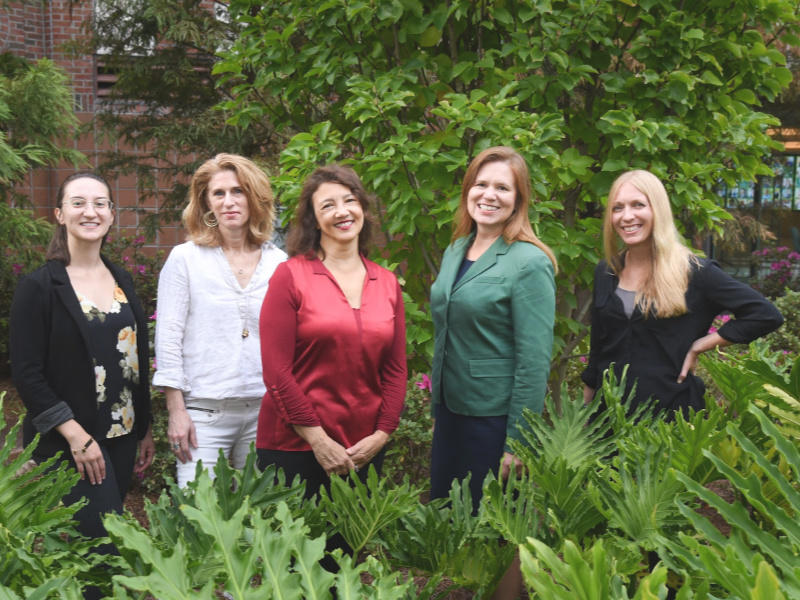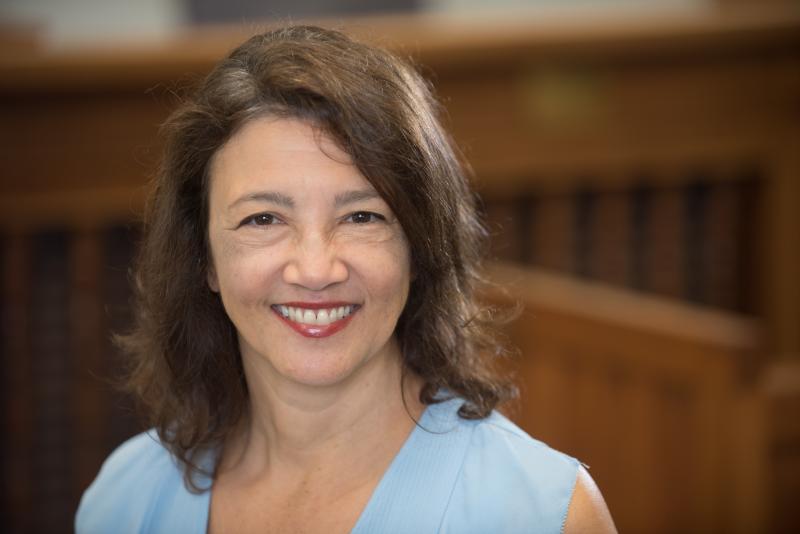Home / Environmental Law Clinic: Empowering communities
Environmental Law Clinic: Empowering communities
September 24, 2019 2:45 PM

(L-R) TELC: Salina Masone, Elizabeth Livingston de Calderon, Lisa Jordan, Lauren Godshall and Kimberly Terrell. (Photo credit: Tracie Morris Schaefer)
For the Tulane Environmental Law Clinic (TELC), the spring and summer of 2019 brought big changes and remarkable accomplishments.
July was an unforgettable, red-letter month for the clinic. We settled a lawsuit against the Louisiana Department of Environmental Quality (LDEQ), resulting in a more thorough assessment of air pollution levels at the NuStar petroleum storage facility in St. James Parish. Located in the heart of “Cancer Alley,” NuStar’s facility shares a fence line with the low-income, black community of Burton Lane, providing a stark example of Louisiana’s legacy of environmental injustice.
That same month, we learned that LDEQ denied an application by Mosaic for approval to spray toxic waste into the air at its fertilizer plant near the low-income, African American community of Romeville. This denial came after TELC filed opposition comments with LDEQ on behalf of local residents. Mosaic’s goal was to dispose of more than 200 million gallons of toxic, radioactive wastewater using spray-evaporation; the comments filed by TELC revealed fundamental flaws in the company’s application to LDEQ, including the erroneous claim that the toxic overspray would travel upwind, away from our clients’ homes.

Finally, as New Orleans was bracing for another hurricane, TELC discovered that the St. James Parish Council and Planning Commission held a secret, closed-door meeting with Wanhua, a China-based chemical company proposing to build a chemical plant that would emit over 600,000 lbs/year of toxic air pollution in Convent, La. The closed-door meeting was held just three days before the Planning Commission narrowly voted to approve Wanhua’s application to build the plant. TELC promptly filed an open meetings lawsuit against St. James Parish on behalf of local residents.
Parish officials’ decision to hold the secret meeting needed to be addressed, particularly given the ongoing, well-publicized opposition to Wanhua’s plant by local residents; weeks earlier, TELC had submitted extensive comments to the parish on behalf local residents and environmentalists concerned about the health and safety risks associated with the plant, particularly its production of phosgene, a deadly gas used in chemical warfare.
When the Planning Commission failed to address these concerns and approved the project, TELC appealed the decision to the St. James Parish Council on behalf of its clients. This appeal raised key questions about Wanhua’s outsourcing of jobs/contracts, its ties to the Chinese Communist Party, and the risk of fatalities from a potential phosgene leak. These issues became the focus of extensive media coverage, which along with TELC’s open meetings lawsuit, increased pressure on Wanhua to change course. In a dramatic turn of events earlier this month, Wanhua withdrew its parish application for the project, citing the rising costs of materials in light of the U.S. trade war with China. However, both the Parish President and an LSU economist acknowledged that our clients’ opposition had a played key role in Wanhua’s decision. For our clients this was a remarkable, well-deserved victory.
While TELC celebrates its successes, we’re not slowing down. Residents of nearby communities continue to face new challenges from industrialization, and we’re working continuously to empower them. Often, TELC is our clients’ only viable option for legal assistance, and our work gives Tulane Law students a window into the real-world struggles of these clients.
Our students were an integral part of our caseload this spring and summer, both with the Wanhua application and the open meetings lawsuit; working on these issues, regardless of the outcome, helps our students become more effective attorneys with a deeper appreciation for the wisdom, strength and resilience present within historically-marginalized communities.
The face of the clinic is also changing. This past April, we welcomed Salina Masone as the Clinic’s new Administrative Secretary. Salina, a recent Loyola MBA graduate, brings a new business-oriented perspective to the clinic and is thrilled to be part of our team. In July, we were fortunate to have Lauren Godshall join as a Supervising Attorney. Lauren, who earned her JD at NYU Law School, brings extensive experience from private practice in environmental and energy-related disputes and litigation. We’re delighted that Salina and Lauren have joined TELC and have been able to share in several of our recent successes.
While we have a great deal of work ahead of us this academic year, our clients and students provide us with inspiration to take on new challenges, particularly as we’ve seen them become energized and empowered by our recent, hard-fought victories.
Here is to a successful year!
Sincerely,
Lisa Jordan
Director, Tulane Environmental Law Clinic